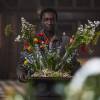In the American Masters documentary Ursula K. Le Guin, witness the boundary-breaking genius of a young mother and writer who brought science fiction into the literary mainstream and transformed American literature in the process. It explores the personal and professional life of the notoriously private author through revealing interviews with her family, friends and the generations of renowned writers she influenced.
Over the last decade, director Arwen Curry got to know her subject by filming conversations with Le Guin, who died in January 2018 at the age of 88. “I had been a reader of Ursula K. Le Guin’s books as a young person and was curious about who the person was behind the novels,” Curry said in an interview with California Humanities, an independent grant-making organization. “I wanted to know more about the person who had invented these worlds and decided that it should be a film.”
Born as Ursula Kroeber in 1929, Le Guin grew up in Berkeley, Calif. Her father was the head of the University of California’s anthropology department, and her mother was a writer best known for her work chronicling the extinction of the indigenous Yahi tribe. Her exposure to different cultures at an early age helped to shape the unique perspective she brought to her novels about otherworldly societies.
While attending Radcliffe College, she worked on the literary magazine but none of her writing ever got published, said biographer Julie Phillips. “The important writers of the moment were very macho, very masculine,” she said. “It was all realism. It was all male, and she went looking for a space that she could make her own.”
As a graduate student at Columbia University, she met fellow Fulbright scholar Charles Le Guin. They married in Paris and eventually moved to Portland, Oregon, where they started a family. Le Guin began writing while raising three children, but her manuscripts were regularly rejected. Eventually one of her stories got accepted by a pulp science fiction magazine. “It definitely encouraged me to look more seriously at fantasy and science fiction as a definition of the kind of thing I was writing, which was never really mainstream realism,” she said.
Her first major breakthrough came in 1968 with the young adult novel A Wizard of Earthsea, set in a magical archipelago filled with magic and dragons. In 1969, Le Guin’s The Left Hand of Darkness—celebrating its 50th anniversary this year—explored a world where people don’t have fixed genders. Five years later, her utopian science fiction novel Dispossessed won several awards and much critical acclaim.
By the late 1970s, she finally began to explore female characters with greater confidence. “What I was doing was being a woman pretending to think like a man,” she said, reflecting on why her early novels put men at the center of the action. At the heart of the American Masters film is Le Guin’s intimate journey of self-discovery as she comes into her own as a major feminist author.
Through her influential work, Le Guin opened doors for generations of younger writers like Neil Gaiman, Margaret Atwood, Michael Chabon and David Mitchell—all of whom appear in the film—to explore fantastic elements in their writing. Voted into the American Academy of Arts and Letters, Le Guin completed 21 novels, 11 volumes of short stories, four collections of essays, 12 children’s books, six volumes of poetry over 60 years, and received numerous honors, including the National Book Award and Hugo Award.
“I never decided I wanted to be a writer,” said Le Guin of her prolific career. “I just wrote. It’s what I did. It’s the way my being was.” Step inside the dramatic life experiences that shaped Le Guin’s fantastic worlds in the American Masters portrayal of the woman behind the writer.
American Masters: Ursula K. Le Guin premieres on Friday, August 2 at 9pm on WGBH2.




